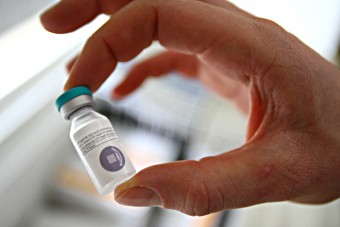
The Gavi-supported pentavalent vaccine which includes the Haemophilus influenzae type b antigen.
Geneva, 5 February 2016 - Research funded by the Wellcome Trust and Gavi, the Vaccine Alliance has provided compelling new evidence that three doses of Haemophilus influenzae type b (Hib) vaccine can give children in low-income countries long-lasting protection against life-threatening disease.
Published in the journal Lancet Global Health today, the study was carried out in the Kilifi region of Kenya over a period of 15 years.
The results document the near elimination of invasive Hib disease in the region in the 12 years following the vaccine’s introduction. During this time, the incidence rate of invasive Hib disease declined from 62.5 cases per 100,000 in 2000 to 4.5 cases per 100,000 in 2014, a 93% reduction. In the last five years, just one case was detected in a child under the age of five.
Prior to widespread vaccine use, Hib was the most common cause of bacterial meningitis and an important cause of severe pneumonia in children under five years old worldwide. Today, thanks in large part to vaccines, the disease has been virtually eliminated in many high-income countries and significantly reduced in low-income countries.
The research also provides policy makers in similar countries with a clear answer to the question of whether a fourth booster shot is needed to control Hib-related disease, such as meningitis, sepsis and pneumonia.
Currently, World Health Organization guidelines recommend three doses are administered to infants at six, ten and 14 weeks of age. However, in many high-income countries an additional fourth booster dose was introduced after immunity in older children was found to wane. The new study demonstrates that for countries like Kenya a fourth booster is not necessary to control Hib disease.
The research was lead by Professor Anthony Scott, who is based at the KEMRI-Wellcome Research Programme in Kilifi, Kenya and the London School of Hygiene & Tropical Medicine in the UK. It was funded by Gavi, the European Society for Paediatric Infectious Diseases and the Wellcome Trust.
